
|
|
|||||||||||||||
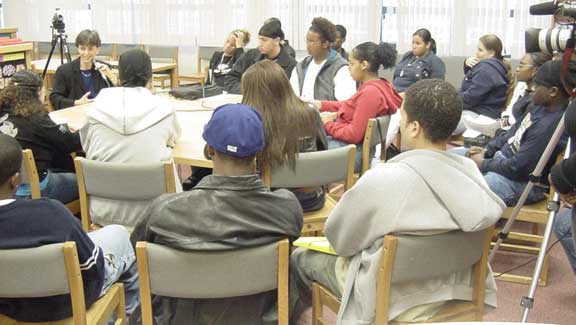 |
A class at West Side High School in Manhattan listens to Veterans for Peace member Mary Reynolds Powell, who served as a captain in the Army Nurse Corps in Vietnam in 1970-71. Powell is the author of A World of Hurt: Between Innocence and Arrogance in Vietnam. Photo by NY Vets for Peace. |
Anyone can do this kind of classroom visit, although it’s often easier for veterans to gain access to the education system, since as “primary sources” we are considered more credible. Who better to talk about war than veterans and civilians who have been directly affected by wars? Each speaker has a personal story to tell, and the experience and understanding of what a young person feels when “put in harm’s way.”
How to get started? The process is the same everywhere. All you have to do is make a list of every educational facility that serves 16-22 year-olds in your area. What are your priorities? Gifted kids are not going to join the military, and higher-income students will most likely go to college. So who is recruited? In urban areas, Latino males are the primary target. Black families are more skeptical now. In rural areas, where parents are more likely to have served in the military, every student is a target, and Army and Marine Corps recruiters have easy access to most schools.
In early May we debated Army recruiters at Columbus High School in the Bronx, a 4,000-student school now split into four smaller schools. The next day we went to a small rural high school tucked away in the Catskills. What do these two schools have in common? They are both heavily recruited.
One of our handouts is the IVAW flyer, “The 10 Lies Told By Recruiters.” The students in both schools smiled as they read the flyer and then started recounting the lies they had been told. This discussion prompted students to question the “psych” factor of the lies told by recruiters versus the reality of basic training. Always, the students without a plan for the future are asking for alternatives. We have some but we need many more to address the needs of this generation.
Recruiters try to say things are different now than they were during earlier wars like Vietnam. But the experiences we had as recruits are the same as those of today’s recruits. We are all instructed in following orders without question, we get a basic course in “racism” (who we need to hate in this war) and the usual super-patriotism motivations. Somehow all this is incorporated into an alleged adherence to the 10 Commandments.
In our classroom visits, we often talk to students about “the things that we carry” to help them to understand the message of Tim O’Brien in his book of that name. Dayl Wise and I frequently work together as a team. Dayl describes one of his flashbacks of going through a village near the Cambodian border: “I had to get to the other side to pick up a chopper ride. I could do that... I have an M-16, 200 rounds of ammo and 4 grenades. I could have killed everyone ….nobody in the military would have cared.”
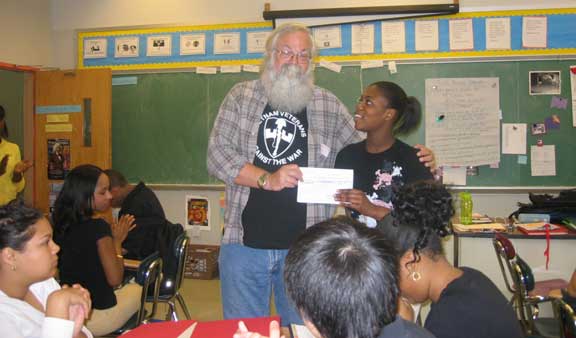 |
Aneka Hewitt, a student activist at the High School For Global Citizenship in Prospect Heights, Brooklyn, won first place in the 2006-2007 anti-war poetry contest sponsored by New York Veterans Speak Out with a poem titled "In the Eyes." In this photo, Aneka receives the prize--a $500 check for college--from Jim Murphy of New York Veterans Speak Out. Photo by NY Vets for Peace. |
Sometimes we lighten up—we need for the kids to see us as humans, not just old gray-haired veterans. So Dayl will describe the rations that we ate in Vietnam and then point out how wonderful school lunch is by comparison—which always gets a laugh and a fun argument.
Our main goal is to make sure the kids realize that the pain may be life long and that we destroyed a beautiful culture. War is not a movie... it’s 23 hours and 59 minutes of boredom, loneliness, anger and stupid games—and one minute in which your life can change forever and your buddies killed or wounded.
Do we need more opportunities to spread our message? Yes! There are a lot of combat veterans who could be talking to young people, but many have not had any prior training or experience with making presentations to high school classes. With help from a Muste Institute grant, we held a “Taking Back Our Schools” workshop in September 2006 in Manhattan with veterans, teachers, students and community activists. In the morning session we did a training with veterans where they took turns presenting to the group as they would present to a classroom. We filmed the training and created a DVD of it which we have sent out to over 200 veterans’ groups around the country who requested it to help them start local speakers’ programs in their communities.
Anyone who wants a copy of the training DVD can contact me, Jim Murphy, via email at [email protected] or by phone at 845-358-5709
Veterans for Peace NY: veteransforpeaceny.org
What's Happening with the Building?
Most of you first heard about the structural problems with our building last August, when I wrote about the situation in the fall issue of Muste Notes. Since then, the Muste Institute's Board of Directors and staff have worked hard to gather information as we consider whether it's possible to raise the money to substantially renovate the building or if we should sell the building and relocate to another space in New York City.
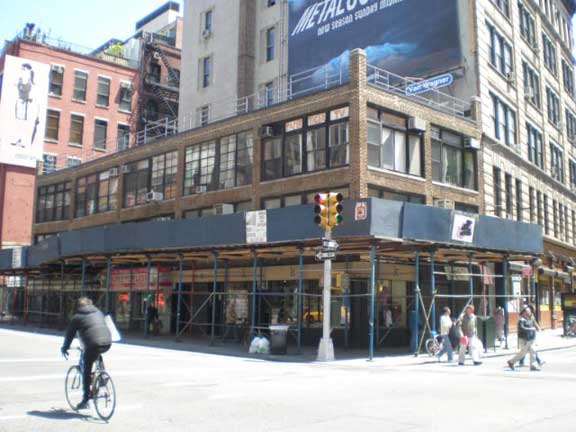 |
Photo by Murray Rosenblith. |
The initial estimate of $1 million now seems optimistic even for the most basic repairs to our three story, walk-up loft building built in the 1920s. It would certainly cost a great deal more to make the building wheelchair accessible, more energy efficient and functional as a long term home for the Institute, War Resisters League and our other tenant groups.
The Muste Institute has no operating endowment, and a major capital project would require engaging outside consultants for planning, fund raising and construction management. We've explored grants, loans and how to increase the income from the commercial space on the ground floor to help pay for such a project. We have met with other progressive groups seeking permanent space in New York to explore creating a partnership to own and operate the building. We have contracted for a complete engineer's survey on the existing structure which we expect to be completed by late June.
Early this year, a group of people who have been associated with the Peace Pentagon came together with the goal of restoring the building. This ad-hoc committee is to present a plan to the Board in early June for raising the money needed to do this. After considering this presentation, the engineer's report and all the other factors, the Board will decide whether it appears feasible to stay at 339 Lafayette Street. These are not easy decisions. We recognize that they will have a tremendous impact on the long term future of the Institute. While this process continues, we urge those who support the Muste Institute, and who value all of our contributions to the movement for social justice, to show us some encouragement by making a donation. If you believe we should keep the building, you can make a pledge or contribute now (to help offset the cost of the engineer's report, for example). If you are excited about our programs promoting nonviolent activism for social justice, your increased donations will help us maintain that work through this challenging time.
—Peter Muste
The A.J. Muste Memorial Institute makes small grants to groups engaged in nonviolent education and action for social justice. Our next deadline is October 3, 2008. Guidelines are at www.ajmuste.org/ guidelin.htm.
CALIFORNIA PRISON MORATORIUM PROJECT
Fresno, CA: $2,000
The California Prison Moratorium Project was founded in 1998 with the
goal of stopping the expansion of the state’s prison system. This
grant goes for a campaign to build public opposition to construction
of a new juvenile jail in Fresno, California. www.calipmp.org/
COMMUNITY MEDIA ORGANIZING PROJECT
Knoxville, TN: $2,000
The Community Media Organizing Project is a partnership of six community-
based organizations in the southeast which joined together to increase
their capacity for using media coverage as an organizing tool. This grant
goes for media trainings to help Greater Birmingham Ministries carry
out the Constitutional Reform Initiative, an effort to build public opinion
toward eliminating codified economic and racial inequalities in Alabama.
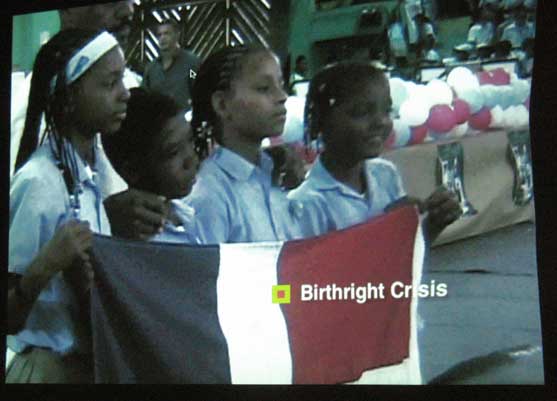 |
In a scene from the documentary "Birthright Crisis," produced by Haitian Women for Haitian Refugees, children demonstrate in Santo Domingo to protest a policy of scapegoating, attacks and deportations against Dominicans of Haitian descent. Photo by Haitian Women for Haitian Refugees |
HAITIAN WOMEN FOR HAITIAN REFUGEES
Brooklyn, NY: $2,000
Two Haitian-American women activists founded this group in 1992 to help
Haitian refugees deal with the challenges of survival in the U.S. Our
grant goes to distribute the Birthright Crisis video among Dominican
and Haitian communities in New York City and beyond, with the goal of
building opposition to racism and discrimination.
MISSOURIANS TO ABOLISH THE DEATH PENALTY
Saint Louis, MO: $2,000
This group started out as a loosely structured statewide abolition coalition
in 1987. This grant goes for the “Road Trip for Justice” project,
organizing speaking events in five Missouri cities to raise awareness
about and build public opposition to the death penalty.
www.moabolition.org/
VILLAGE COMMUNITY WELFARE SOCIETY
Pudukottai, Tamilnadu, India: $1,987
Since 1993, this group has been promoting sustainable agriculture, women’s
empowerment and labor justice. Our grant goes to mobilize domestic workers
in Pudukottai district in defense of their human and labor rights
Counter-Recruitment Grants, April 2008
The Muste Institute’s Counter Recruitment Fund supports grassroots efforts to inform young people about the realities of military service, help them protect their privacy from recruiters and refer them to non-military options. Our next deadline is October 3, 2008. Guidelines are at www.ajmuste.org/counter-recruit.htm
American Friends Service Committee - Hawai’i Area Office, Honolulu, HI: $1,200 for “Increase the Peace,” a program of events in Hawaii schools focusing on alternatives to the military and development of educational materials geared toward Native Hawaiian, Filipino and Pacific Islander students. http://afschawaii.org/
High Rocks Educational Corporation, Hillsboro, WV: $800 for a project serving high school-age young women in the rural West Virginia counties of Greenbrier, Pocahontas, and Nicholas, helping them explore vocational and educational opportunities outside of the military. www.highrocks.org/
Peace Action Wisconsin, Milwaukee, WI: $1,000 to expand efforts to educate youth about the realities of military service and educational and vocational alternatives, with a focus on low income students from the African American, Latino and Hmong communities in and around Milwaukee. www.peaceactionwi.org/
Rochester Against War (RAW), Rochester, NY: $1,000 for an “Anti-War Crisis Center” storefront to serve as a meeting and event space for youth and a resource center for information about the realities of military service and educational and vocational alternatives. www.rochesteragainstwar.org/
Washington Truth in Recruiting (WaTiR), Bellevue, WA: $1,000 for a program reaching out to parents, teachers, coaches, boards of education, superintendents, principals, student leaders and counselors in rural and eastern areas of Washington state, educating them about military recruiting practices in the public schools. www.watir.org
NOVA Travel Grants, February and April 2008
The NOVA Travel Fund helps grassroots activists from Latin American, Caribbean and indigenous North American organizations to participate in regional meetings. The next deadlines are August 1 and October 1, 2008. Guidelines are in Spanish at www.ajmuste.org/novaintro.html.
February 2008: 3 grants totaling $2,350
Asociación Unión Nacional de Mujeres Kunas, Panama City, Panama: $700 for a representative of the National Union of Kuna Women to participate in the First International Forum of Indigenous Women “Sharing Advances for New Challenges” held April 13-16, 2008 in Lima, Peru.
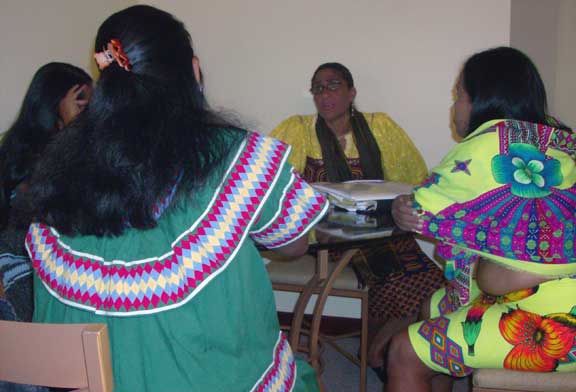 |
Dialys Ehrman of the National Union of Kuna Women speaks with other participants at a workshop during the First International Forum of Indigenous Women in Lima, Peru. |
Comisión Multisectorial, Montevideo, Uruguay: $450 for activist Anahit Aharonian to participate in the 6th meeting of the Unión de Asambleas Ciudadanas (Union of Citizen Assemblies, UAC), held April 4-6, 2008 in Capilla del Monte, Córdoba, Argentina.
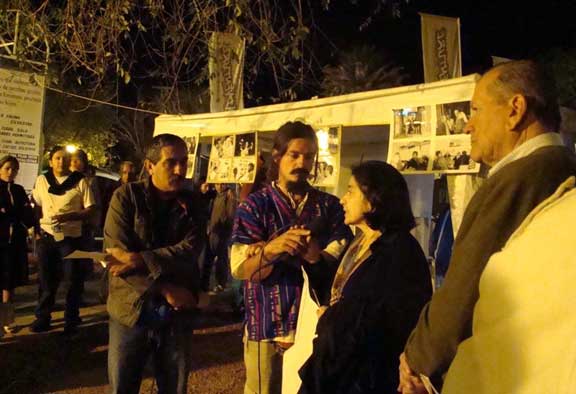 |
Anahit Aharonian of the Multisectorial Commission is interviewed by reporters from Radio Abierta (Open Radio) at the Union of Citizen Assemblies meeting in Capilla del Monte, Argentina. |
Movimiento por la Paz, la Soberanía y la Solidaridad entre los Pueblos, Buenos Aires, Argentina: $1,200 for a representative of the Movement for Peace, Sovereignty and Solidarity Among Peoples (MOPASSOL) to participate in the 2nd Hemispheric Meeting of Struggle Against Militarization, scheduled for October 7-12, 2008 in Honduras.
April 2008: 5 grants totaling $4,100
Grupo de Trabajo Independiente sobre Saberes Ancestrales y Biodiversidad del Napo, Napo Ecuador: $800 for two indigenous Kichua midwives and/or traditional healers, organized in the Independent Working Group on Ancestral Knowledge and Biodiversity in Napo, to travel to the 11th International Congress of Ethnobiology, “Livelihoods and Collective Biocultural Heritage,” to take place June 25-30 in Cusco, Peru. The objective of the congress is to reinforce the role of indigenous people and local communities in the management of their collective biocultural heritage.
Asamblea de los Pueblos del Caribe (Capitulo Republica Dominicana), Santo Domingo, Dominican Republic: $1,050 for two representatives from the Dominican Republic chapter of the Caribbean Peoples Assembly to coordinate their struggles with the other social movements of the Caribbean at the 4th Caribbean Peoples Assembly June 28 to July 5 in Havana, Cuba.
Centro de Derechos Humanos Tepeyac del Istmo de Tehuantepec, Santo Domingo Tehuantepec, Oaxaca, Mexico: $800 for Rosalba Vásquez Contreras of Communities for the Defense of Irrigation Waters in Santo Domingo Tehuantepec to participate in the 4th Latin American Meeting of Redlar, the Latin American Network Against Dams in Defense of Rivers, Water and Communities, to be held July 22-26 in Santa Cruz de Lorica, in northern Colombia.
Movimiento Nacional Anti Represas de El Salvador (MONARES), San Salvador, El Salvador: $800 for a representative of the National Anti-Dam Movement of El Salvador to participate in the same Redlar meeting in July in Colombia.
Federación Costarricense para la Conservación del Ambiente (FECON), San José, Costa Rica: $650 for María Adelita Lázaro Ortiz of the Regional Indigenous Council of the Southern Zone to participate in the same Redlar meeting in July in Colombia.